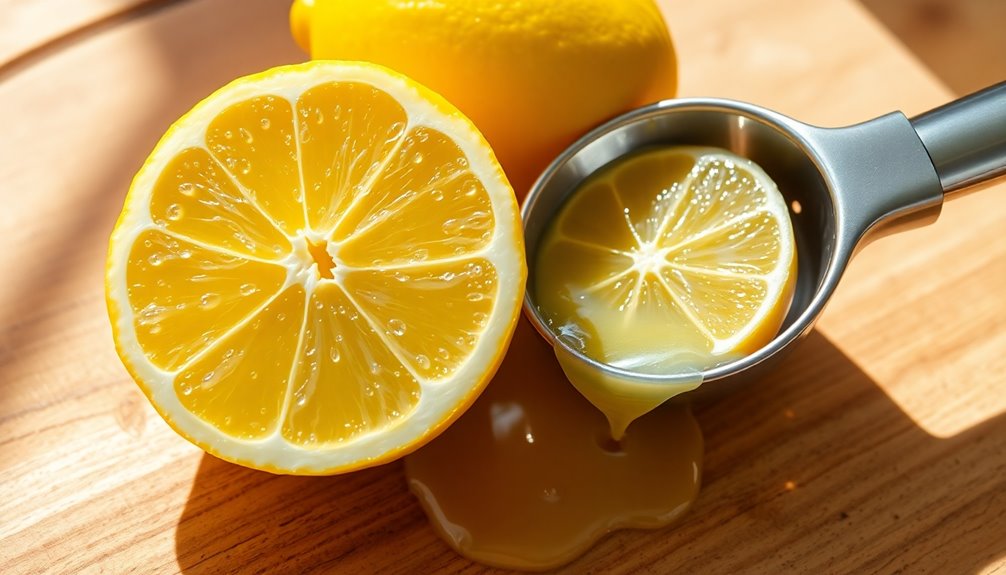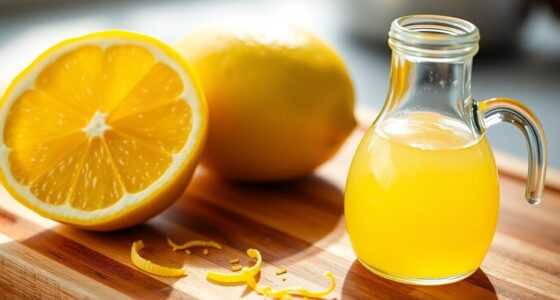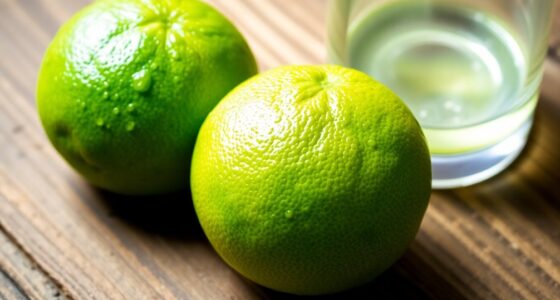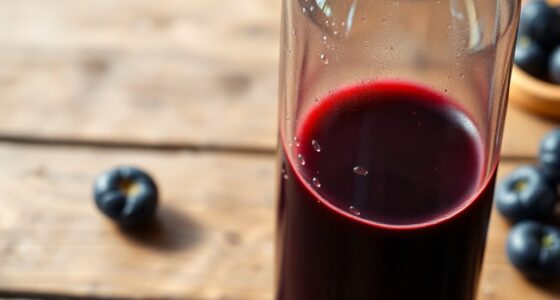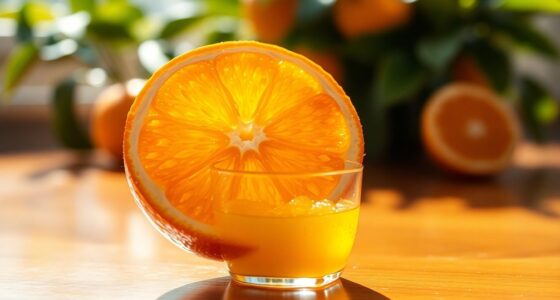When you squeeze one lemon, you can expect to get about 2 to 4 tablespoons of juice, depending on its size. A medium lemon usually gives you around 3 tablespoons, while a large lemon can yield up to 4 tablespoons. If you use small lemons, you'll only get about 2 tablespoons. Choosing ripe lemons and employing a few simple techniques can help you maximize the juice you extract. Discover more tips to enhance your lemon juice extraction!
Key Takeaways
- A medium lemon typically yields about 3 tablespoons of juice.
- A large lemon can produce up to 4 tablespoons of juice.
- A small lemon usually yields around 2 tablespoons of juice.
- The juiciness of a lemon may vary based on its ripeness.
- Techniques like warming or rolling can enhance juice extraction from lemons.
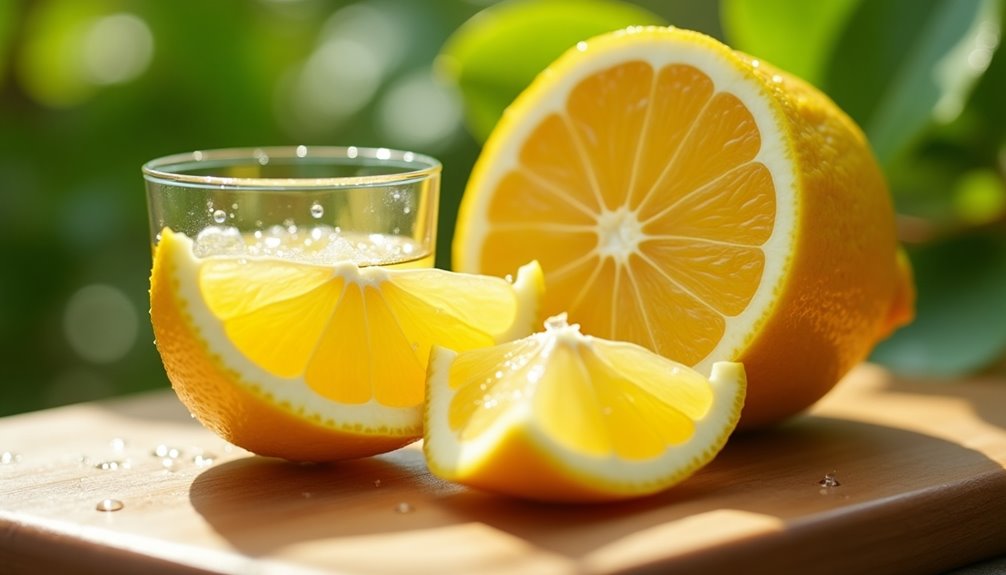
When you're squeezing a lemon, you can expect to get anywhere from 2 to 4 tablespoons of juice, depending on the lemon's size and ripeness. If you've ever wondered how much juice you can extract from different sizes of lemons, you'll find that the medium lemon typically yields about 3 tablespoons of juice.
On the other hand, a large lemon can produce up to 4 tablespoons, which is a handy amount if you're tackling a recipe that requires a significant amount of lemon juice. If you're working with a small lemon, you'll likely get around 2 tablespoons of juice, so it's essential to consider the size when planning your cooking or baking.
When you're preparing recipes that call for lemon juice, knowing the amount of juice each lemon yields can save you time and ensure your dish turns out as intended. For example, if a recipe requires ½ cup of lemon juice, you'll need approximately 3 medium lemons or 2 large lemons to achieve that goal.
This is particularly useful when you're cooking for a group or need a specific flavor profile in your dish. Keeping track of these measurements can really elevate your cooking game.
One thing to remember is that the ripeness of the lemon can significantly affect the juice extraction. A ripe lemon will generally produce more juice than an under-ripened one.
To maximize juice extraction, consider warming the lemon in the microwave for about 10-20 seconds. This simple trick can help break down the cell walls inside the lemon, allowing for more juice to be released.
After warming, rolling the lemon on a hard surface can also help you extract more juice. It's a quick and effective method that can make a noticeable difference in the amount of juice you get from one lemon.
When you're sourcing lemons, consider how they grow on a lemon tree. The best lemons are often harvested at peak ripeness, ensuring that they're juicy and flavorful.
If you have access to a lemon tree, you'll find that fresh lemons can provide a superior taste and juice yield compared to store-bought options. Fresh lemons tend to be plumper and juicier, making them ideal for your culinary needs.
Frequently Asked Questions
How Much Juice Is in 1/2 Lemon?
When you’re squeezing half a lemon, you can expect to get about 1½ tablespoons of juice from a medium lemon. The amount of juice can vary slightly depending on the lemon’s ripeness and size, but generally, this is a reliable estimate. If you’re wondering how much juice from one lemon you might need for a recipe, it’s always a good idea to have an extra lemon on hand, just in case. Fresh lemon juice can enhance the flavor of many dishes, making it a versatile ingredient in your kitchen.
If you use a large lemon, you might get closer to 2 tablespoons. Of course, the actual amount can vary based on the lemon's ripeness and size.
To get the most juice, roll the lemon on the countertop before cutting.
Adjust the amount based on your taste preferences for the best flavor in your dish.
How Much Concentrated Lemon Juice Equals 1/2 Lemon?
To substitute for the juice of half a lemon, you'll need about 1.5 tablespoons of concentrated lemon juice.
Keep in mind that concentrated juice may pack a stronger flavor, so you might want to adjust the quantity based on your taste.
While it's convenient, it won't always replicate the fresh, zesty flavor of freshly squeezed lemon juice, so be mindful when you're using it in your recipes for the best results.
Can I Use Bottled Lemon Juice Instead of Fresh Lemon?
Sure, you can use bottled lemon juice instead of fresh lemon, but it's like trading a gourmet meal for fast food!
Bottled juice can't match the vibrant flavor and aroma of freshly squeezed lemons. You'll often need to use more of it to get that punchy taste.
Plus, fresh juice packs a nutritional kick that bottled varieties can't compete with.
For the best results in your cooking, stick with the real thing whenever you can!
How Many Teaspoons Are in 2 Lemons?
If you're wondering how many teaspoons are in 2 lemons, it largely depends on their size.
Typically, two medium lemons yield about 6 tablespoons of juice, which equals 18 teaspoons.
If your lemons are large, you might get around 16 teaspoons, while smaller ones could give you about 12 teaspoons.
Since the yield can vary, it's a good idea to have an extra lemon or two on hand, just in case!
Conclusion
So, next time you grab a lemon, remember that you're likely to get about 2 to 3 tablespoons of juice. Isn't it funny how something so small packs such a flavorful punch? You might just find yourself squeezing one for that perfect salad dressing or zesty lemonade, and suddenly, it feels like a coincidence that you had a lemon on hand. Embrace those little moments—they can brighten your day just as much as that fresh lemon juice!
Cindy thoroughly researches juicing trends, techniques, and recipes to provide readers with practical advice and inspiration. Her writing style is accessible, engaging, and designed to make complex concepts easy to understand. Cindy’s dedication to promoting the advantages of juicing shines through her work, empowering readers to make positive changes in their lives through the simple act of juicing.

